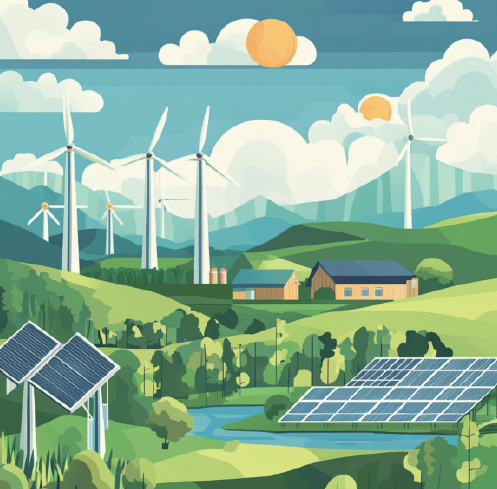As Donald Trump begins his second term as President of the United States, there are widespread concerns about global cooperation to reduce fossil fuel consumption. Given his past actions on climate change and the many "bad climate promises" he has made, it is expected that he will continue to take many backward steps on climate issues over the next four years.
First, the already fragile effectiveness of the Paris Agreement will be further weakened by the US withdrawal. Trump has also made it clear that he does not want to contribute to the UN Green Climate Fund. As the UN Framework Convention on Climate Change makes clear, developed countries should play a leading role in reducing emissions and have an obligation to provide financial, technological, and capacity support to developing countries. There are legitimate concerns that Trump could withdraw the US from the Convention, further undermining confidence in global climate governance, destroying an already fragile consensus and foundation, and plunging global climate governance into an even greater deficit of trust, finance, and governance.
The future of global climate governance is becoming even bleaker.
Second, Trump will continue to promote the extraction and use of fossil fuels in the US, which means that clean energy development in the country will remain slow. Over the next four years, the US under Trump's leadership will significantly loosen regulations on fossil fuels such as coal, oil and gas. Possible directions for this relaxation include reducing emissions requirements for operating coal plants, extending time frames for shutting them down, and relaxing requirements for equipping new coal plants to capture carbon. Trump's energy and climate policy does not emphasize a green and low-carbon transition, but emphasizes the security of cheap American energy.
More importantly, Trump will impede the smooth implementation of the Inflation Reduction Act. It is highly likely that Trump will use presidential executive orders to limit the effectiveness of this law, thereby achieving his intent to suspend or delay the implementation of certain parts. Given that this law is a key policy of the previous administration to promote clean energy development, Trump's decision is bad news for the US and the world.
Given these grim realities, the importance of cooperation between China and the European Union in tackling the climate crisis is more than obvious. Despite years of discussion on how to reduce emissions, global greenhouse gas emissions, far from peaking, are still rising. At the same time, global temperatures are rising significantly. Progress in global climate governance concerns everyone who cares about the future of humanity. According to the most recent data from the World Meteorological Organization, in 2024, the global average temperature was 1.5°C higher than between 1850 and 1900, suggesting that the rate of temperature increase due to industrialization is faster than climate scientists predicted.
Third, the international community will soon face the depletion of its future carbon budget. According to the latest data on the global carbon budget, whether controlling global temperature rise since industrialisation below 1.5°C or below 2°C, the future carbon budget will be limited and soon exhausted. In the future, greater global efforts will be needed to create a concerted push to address climate challenges and ensure that temperature rise remains below 2°C.
Fourth, China and Europe are the main forces pushing the global green transformation, and their support for this transformation remains strong and persistent. Considering the carbon budget, emissions, temperature rise and the climate crisis, the fact that Trump's re-election means that the US is an unreliable force in global climate governance, and therefore cooperation between China and the European Union is absolutely important and necessary.
Responding to the outcome of the US presidential election on 6 November 2024, the European Commission stressed that the EU has very clear and strong climate policies and targets and has taken significant legislative action and other policies to ensure that it achieves its 2050 climate target. In this respect, China, which is also strongly committed to achieving its dual carbon targets by 2060, will have many opportunities to cooperate and create joint initiatives with the EU.
First, China and Europe have a wide scope for cooperation in the development of clean technologies. As Adair Turner, former chairman of the UK Climate Commission, said during his visit to China in late 2024: Given the urgency of the global response to climate change, the importance of the relationship between China and Europe is clear. Europe should welcome the low-carbon benefits of developing and reducing the cost of clean technologies in China and embrace clean technology investment from Chinese companies in Europe. China, the UK and the rest of Europe should seek international trade solutions that lead to win-win outcomes in their relations with each other.
Second, as the EU prepares to implement the Carbon Offset Mechanism (CBAM), cooperation between China and the EU on "greening" high-carbon industries is particularly crucial. If Chinese and European enterprises can strengthen communication and cooperation in related industrial chains and high-carbon sectors, especially in industries where both sides have close ties, particularly in areas such as disclosure, carbon accounting and the development of transformation plans, this will benefit both sides.
Ultimately, Sino-European climate cooperation can involve third parties, which will promote positive forces in the wider region and play a greater role in addressing the climate crisis. For example, there is considerable scope for cooperation between China and the EU in developing sustainable financial standards. There are currently some joint classification catalogues and in the future this cooperation could be extended to multilateral areas to promote exchanges, cooperation and joint production in this area.



